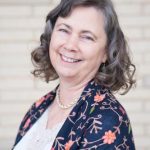Wendy Brown-Báez
Weathering The Storm
In the 1980s, I was part of a group that lived off-grid in the countryside of eastern Oregon. We shared a dilapidated barn, a cabin and a main building on five acres at the edge of a pine forest. A road curved close enough for passing cars to be seen through the trees, but it felt secluded and safe. A stream ran across the property where one of us caught a fish in his hands. The buildings were heated by wood stoves and cutting and stacking wood was a chore all took turns doing, besides gardening, cooking, and going into town for supplies. The main house had electricity but our cabin did not. Every morning I woke at the crack of dawn, stumbled up to the big house, started a fire in the dining room’s stove, and cooked oatmeal for everyone. My boys were four and six years-old, and they were homeschooled with the other children.
Every evening we watched TV together, a ritual that began in the afternoon with the kids watching “Little House on the Prairie” followed by the evening news. Our conversations over dinner were noisy and animated. Sometimes I helped with the dishes, but often as soon as dinner ended, I was ready for a quiet moment by our wood stove before putting the boys to bed.
One evening after Don and I strolled back to the cabin, we were surprised to discover that the boys were not already there.
“Where could they be?” I frowned. Sunlight was disappearing into the indigo blue of twilight and I inhaled the tang of fall coming. We called and called their names. I noticed all the terrible things I had not previously noted: the road was way too close, the woods far too dense. As the first star appeared, I started to panic.
Then out of the woods they came flying, my two boys and a little girl.
“What’s that you got?” Don asked, pulling apart Sam’s small fist to reveal a box of matches.
“We were going to make a campfire,” he confessed, too guileless to lie.
That moment when you realize disaster has been averted, you bless the Angels, the inability of children to know how to lay kindling to start a fire.
Despite all our efforts to protect them, with baby gates and car seats and bike helmets and walking them to the bus stop and warnings and admonitions, despite organic vegetables and wooden instead of plastic toys, despite parental controls on the TV and guidelines about video games, despite checking them for fever and reminders to take their medicine, despite coaching them how to respond when a cop stops them or how to move away from confrontation, despite talks about birth control and self-control, despite calling and leaving a text, despite asking questions that may or may not be answered, we cannot keep our children from the weather of life—storms of uncertainty and the lulls of depression, the rains of comparison to others and the need for peer approval, the lightning strike of encountering someone who snuffs out a life, the sunset of a life-threatening illness, the dark night of loss, the fires of rage at injustice, the floods of disappointment. We prepare them the best we can. But there is a moment when we have to let go. The toddler must learn to walk, the teen must learn to stand up for oneself, the adult must choose the life he or she will live, and hopefully love. No one tells us that our hearts will be broken over and over and over, no one prepares us for how hard it will be when our child is harmed, or his life is taken, or she is traumatized by violence.
In the middle of a mess, in the middle of a loss, it may be hard to remember that a birth is a miracle. That first moment when our child is laid in our arms, we breathe in possibility and hope. And that hope lights up the world.
A match can start a fire. We tell the story, how fragile the thread between life and death. For every mother out there who walks this tightrope, I am extending my hand, saying, You can make it. No matter what happens next, your heart will guide you through. A mother’s heart is made of steel, made of incandescent flame, made of all that we dream for our children and all that we hold close. How beautiful we become in the holding.
 Wendy Brown-Báez is the author of the inspirational guidebook Heart on the Page: A Portable Writing Workshop. Her poetry and prose appear in numerous literary journals including Poets & Writers, Peregrine, Mizna, Water~Stone Review, Tiferet, and Talking Writing. Wendy facilitates writing for healing workshops in community spaces such as healing centers, schools, libraries, prisons, churches, yoga studios, shelters, and community arts organizations, currently online or via Zoom. www.wendybrownbaez.com
Wendy Brown-Báez is the author of the inspirational guidebook Heart on the Page: A Portable Writing Workshop. Her poetry and prose appear in numerous literary journals including Poets & Writers, Peregrine, Mizna, Water~Stone Review, Tiferet, and Talking Writing. Wendy facilitates writing for healing workshops in community spaces such as healing centers, schools, libraries, prisons, churches, yoga studios, shelters, and community arts organizations, currently online or via Zoom. www.wendybrownbaez.com
